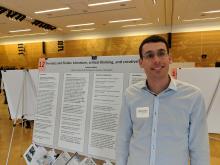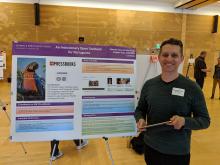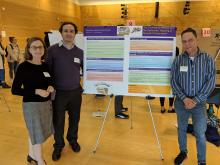On April 17, The Center for Teaching and Learning hosted the UW’s 15th Annual UW Teaching and Learning Symposium. The Symposium highlights research and pedagogy that advance student learning and promote innovation in teaching as well as collaboration among practitioners of Scholarship of Teaching and Learning (SoTL) at UW. It is intended for faculty and graduate students to build a community around teaching and learning, and related research; thus, is designed for interactive presentations and discussions on innovative evidence-based teaching strategies among participants. It also offers a great opportunity to deepen conversations about teaching best practices, principles, learning outcomes and new modes of practice in higher education among colleagues from different disciplines. At this year’s event, five colleagues from the Spanish and Portuguese Department faculty presented their work on the Scholarship of Teaching and Learning (SoTL).
“The Contrastive Method and the Systematic Teaching of Spanish Pronunciation.”. González Casanova, Rueda, and Raneda-Cuartero.
Lecturers Jorge González Casanova, Antonio Rueda, and Principal Lecturer Inma Raneda-Cuartero co-presented a poster entitled “The Contrastive Method and the Systematic Teaching of Spanish Pronunciation.” González Casanova stated that, "since there exists a lack of systematic teaching of pronunciation in Spanish language classes, we created a pronunciation module that uses the Contrastive Method, one that compares the phonetic systems of both English and Spanish. When students become aware that some difficult sounds in Spanish also exist in English, but are represented graphically differently, through frequent practice they are able to improve their pronunciation.”
Reflecting on her participation in this year Symposium, Raneda-Cuartero adds: “The biggest take away at this year Symposium was the conversation with other peers. Seeing UW colleagues present their ideas, seeing their enthusiasm, the inventiveness and energy that really goes into their teaching as well as the creative ways in which they hope to make their students equally passionate about what matters to them, was quite inspiring. I really enjoyed and benefited tremendously from sharing and exchanging my research and findings with other teachers of different disciplines at this year’s Symposium.”
“Pre-texts and finales: Literature, critical thinking, and creative projects,”. Jaffee.
Lecturer Samuel Jaffee presented a poster titled “Pre-texts and finales: Literature, critical thinking, and creative projects,” in which he described his inquiry-based, design-centered pedagogy for teaching Latin American literary and cultural studies courses. Rather than follow a New Critical or New Historical approach, his students study written texts as great artists do—by posing creative and esoteric questions, often by applying methodologies from other disciplines that make the humanities relevant to majors in the arts and STEM fields.
“I have been inspired by linguists such as Jean Lave, Etienne Wenger, and Claire Kramsch, and artist-scholars such as Tim Rollins and Doris Sommer, and I use their approaches to invigorate my assessments,” he said. This curriculum, which includes visual and performance studies, addresses several areas of diversity targeted by Spanish & Portuguese Studies, including Less-Commonly Taught Languages (LCTL). Students study literature in conjunction with other disciplines: pre-Columbian poetry written in Nahuatl and Quechua that reflects Amerindian spirituality, and colonial mapping in Mexico and Peru (SPAN 307), Western philosophy in Latin American fiction (SPAN 309), photography and ekphrasis (SPAN 395), treatment of women and minority groups in dictatorship-era theater (SPAN 447), national myths as depicted in film (SPAN 485), and creative writing based on censored fiction (SPAN 492). Jaffee exhibited student-designed work from these courses—interactionist “finales” (condensed experiments during the 2-hour final exam slot) and individual creative and analytical tasks, for which students apply reasoning and techniques learned in the course to new topics.
“This year, as a participant in the Center for Teaching and Learning’s Evidence-Based Teaching research practicum, I have collaborated with faculty across the UW to design best practices to improve the education of UW students. I have benefited greatly from the support of the Center for Teaching and Learning and collaboration with faculty from other departments, who have shown a deep commitment to designing and implementing equitable and accessible pedagogies and assessments for all UW students,” Jaffee added.
"An Inclusionary Open Textbook for Portuguese¨. Viana da Silva, and Pope.
Eduardo Viana da Silva, Lecturer in Portuguese, and Stephen Pope, TA for Portuguese, presented a poster entitled, "An Inclusionary Open Textbook for Portuguese," detailing the development of the first-year online textbook Bate-Papo. The textbook is part of an Open Educational Resource (OER), available through the University of Washington PressBook platform. Students are able to read the OER textbook online for free while doing the online exercises through the UW Canvas for their Portuguese courses. The poster presentation was well-received and it focused on the inclusionary aspect of this e-text, which promotes the inclusion of sociological categories such as dialect, sociolect, ethnicity, sexual orientation, and religion, among others. 
By presenting in the Symposium their scholarship of teaching and learning, our colleagues have constructively contributed to the teaching and learning dialogue across the UW community, which is central to the University of Washington’s teaching mission. Their evidence-based teaching pedagogy helps to increase student’s engagement, advance student’s learning, and strengthen their enthusiasm for discovery and success. They stated that their conversations and exchanges with other attendees will inspire their teaching and will help them to reflect more deeply on their own teaching practices.
By Inma Raneda-Cuartero, with additional contributions by Sam Jaffee and Eduardo Viana da Silva.
